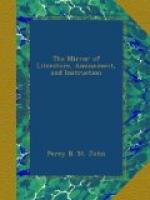The terror-stricken murderer fled before
His crime was known, and ne’er was heard of more.
The poor boy died, sir! uttering fearful cries
In his last dreams, and with his glaring eyes,
And troubled hands, seem’d acting, as it were,
His mother’s fate. Yes, Sir, his grave is there.”
* * * * *
THE SELECTOR AND LITERARY NOTICES OF NEW WORKS.
LANDERS’ DISCOVERY OF THE TERMINATION OF THE NIGER
Our readers are already in possession of the outline of this memorable journey; though nothing but an attentive perusal of the Discoverers’ Narrative can afford them the remotest idea of the dangers they encountered in their progress. To gratify this curiosity, Mr. Murray has considerately enough, printed their Journal in three volumes of the Family Library, and to say that they are, in interest, equal if not superior to any of the Series would be praise inadequate to their merits. The simple, unvarnished style of the Narrative is just suitable for a family fireside. We intend to quote a few scenes: at present
An African Horse-Race,
at Kiama, in the kingdom of Borgoo from the first volume.
“In the afternoon, all the inhabitants of the town, and many from the little villages in its neighbourhood, assembled to witness the horse-racing, which takes place always on the anniversary of the ’Bebun Salah,’ and to which every one had been looking forward with impatience. Previous to its commencement, the king, with his principal attendants, rode slowly round the town, more for the purpose of receiving the admiration and plaudits of his people than to observe where distress more particularly prevailed, which was his avowed intention. A hint from the chief induced us to attend the course with our pistols, to salute him as he rode by; and as we felt a strong inclination to witness the amusements of the day, we were there rather sooner than was necessary, which afforded us, however, a fairer opportunity of observing the various groups of people which were flocking to the scene of amusement.
“The race-course was bounded on the north by low granite hills; on the south by a forest; and on the east and west by tall shady trees, among which were habitations of the people. Under the shadow of these magnificent trees the spectators were assembled, and testified their happiness by their noisy mirth and animated gestures. When we arrived, the king had not made his appearance on the course; but his absence was fully compensated by the pleasure we derived from watching the anxious and animated countenances of the multitude, and in passing our opinions on the taste of the women in the choice and adjustment of their fanciful and many-coloured dresses. The chief’s wives and younger children sat near us in a group by themselves; and were distinguished from




